Entrepreneurial Mindset, Opportunities, and Theories: A Report
VerifiedAdded on 2022/12/27
|12
|2337
|61
Report
AI Summary
This report delves into the critical aspects of entrepreneurship, focusing on the development of an entrepreneurial mindset and the identification and exploitation of business opportunities. It highlights key characteristics of a successful entrepreneurial mindset, including creativity, functional humility, and a disciplined focus on opportunities. The report explores various types of entrepreneurial opportunities and outlines a process for identifying and capitalizing on them, emphasizing the importance of understanding customer needs, researching the competition, and analyzing environmental factors. Furthermore, it examines relevant entrepreneurial theories, such as economic, psychological, and sociological theories, to provide a comprehensive understanding of the entrepreneurial process. The report concludes by underscoring the significance of a healthy entrepreneurial mindset and effective opportunity identification for establishing a thriving enterprise.
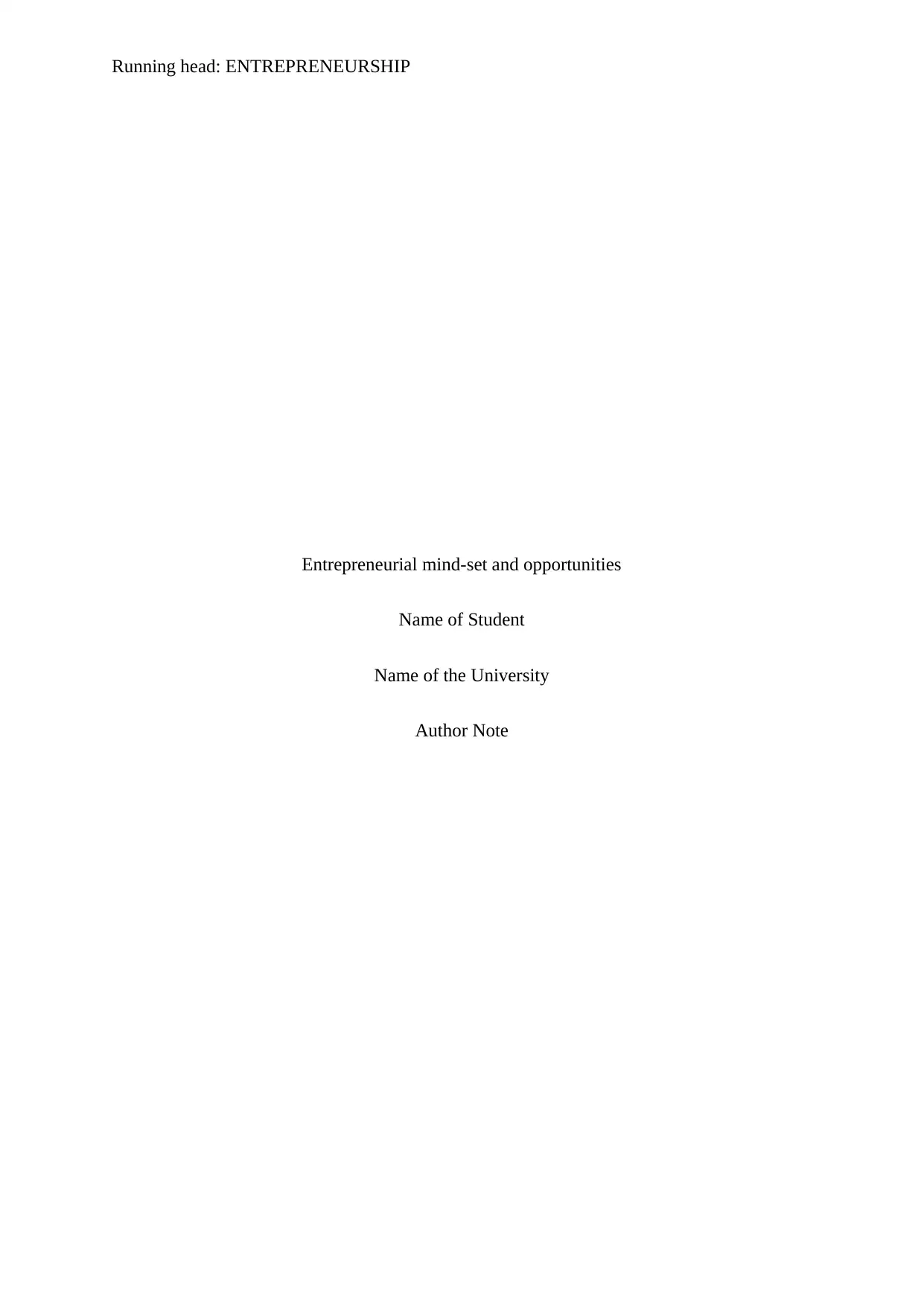
Running head: ENTREPRENEURSHIP
Entrepreneurial mind-set and opportunities
Name of Student
Name of the University
Author Note
Entrepreneurial mind-set and opportunities
Name of Student
Name of the University
Author Note
Paraphrase This Document
Need a fresh take? Get an instant paraphrase of this document with our AI Paraphraser
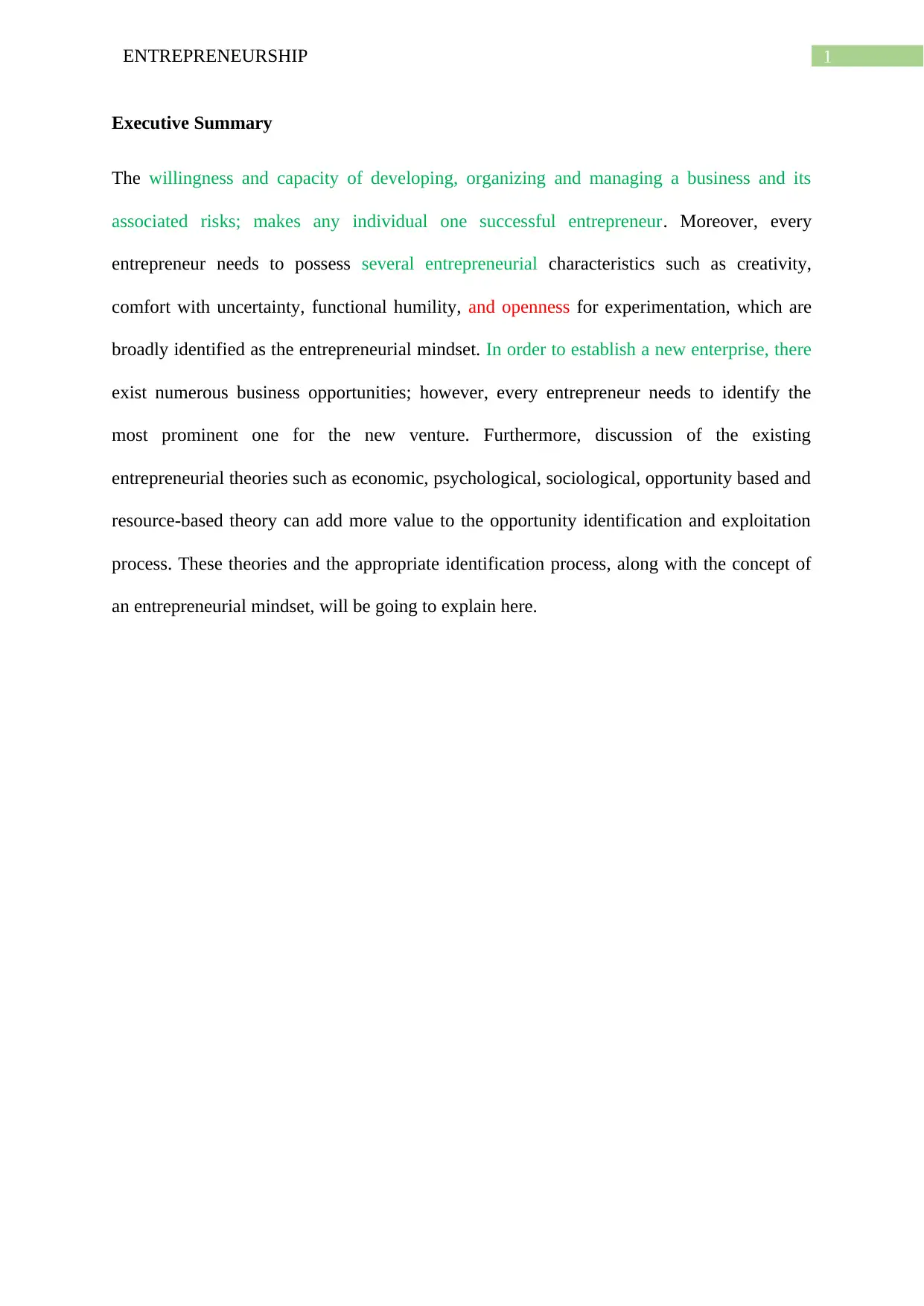
1ENTREPRENEURSHIP
Executive Summary
The willingness and capacity of developing, organizing and managing a business and its
associated risks; makes any individual one successful entrepreneur. Moreover, every
entrepreneur needs to possess several entrepreneurial characteristics such as creativity,
comfort with uncertainty, functional humility, and openness for experimentation, which are
broadly identified as the entrepreneurial mindset. In order to establish a new enterprise, there
exist numerous business opportunities; however, every entrepreneur needs to identify the
most prominent one for the new venture. Furthermore, discussion of the existing
entrepreneurial theories such as economic, psychological, sociological, opportunity based and
resource-based theory can add more value to the opportunity identification and exploitation
process. These theories and the appropriate identification process, along with the concept of
an entrepreneurial mindset, will be going to explain here.
Executive Summary
The willingness and capacity of developing, organizing and managing a business and its
associated risks; makes any individual one successful entrepreneur. Moreover, every
entrepreneur needs to possess several entrepreneurial characteristics such as creativity,
comfort with uncertainty, functional humility, and openness for experimentation, which are
broadly identified as the entrepreneurial mindset. In order to establish a new enterprise, there
exist numerous business opportunities; however, every entrepreneur needs to identify the
most prominent one for the new venture. Furthermore, discussion of the existing
entrepreneurial theories such as economic, psychological, sociological, opportunity based and
resource-based theory can add more value to the opportunity identification and exploitation
process. These theories and the appropriate identification process, along with the concept of
an entrepreneurial mindset, will be going to explain here.
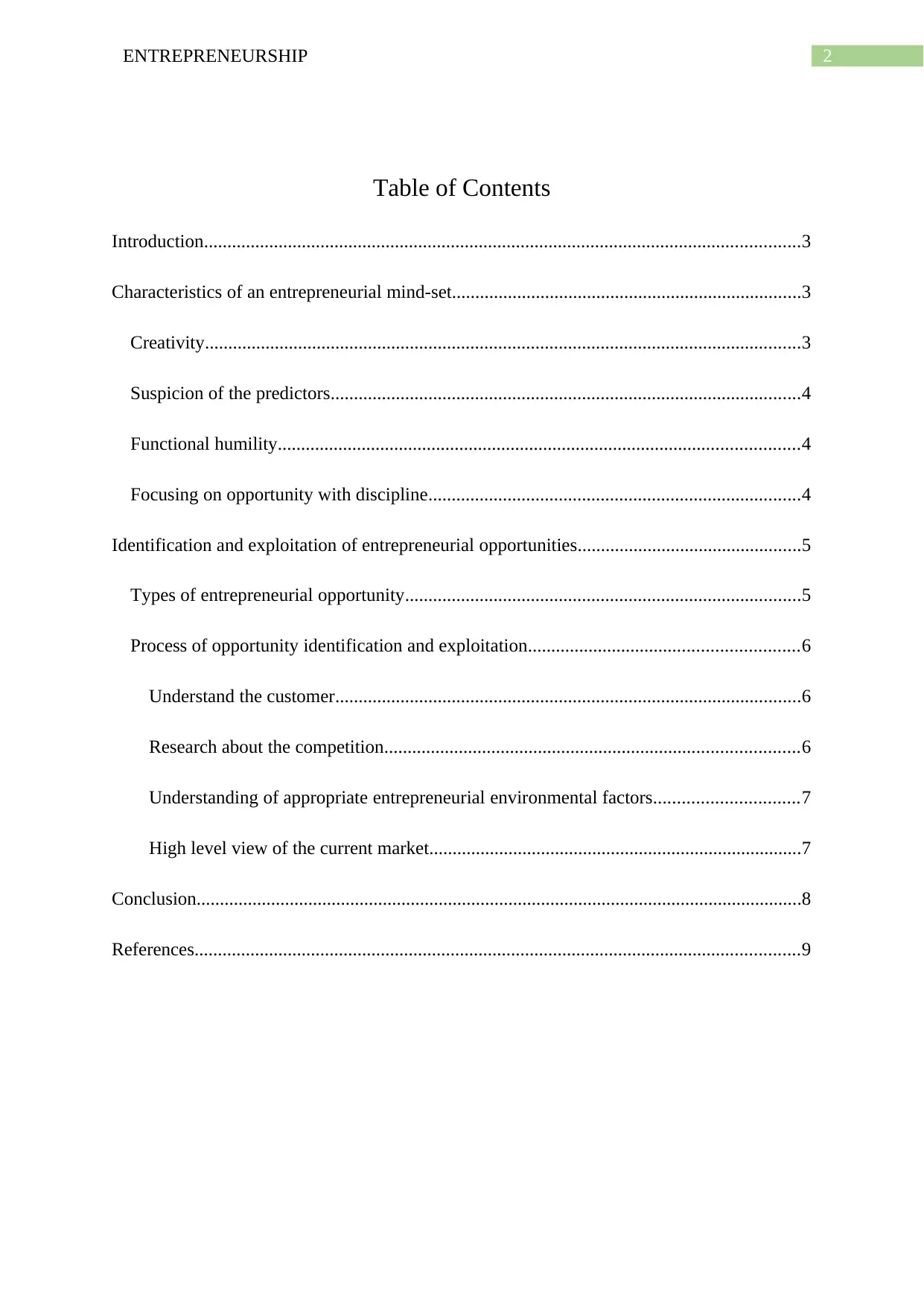
2ENTREPRENEURSHIP
Table of Contents
Introduction................................................................................................................................3
Characteristics of an entrepreneurial mind-set...........................................................................3
Creativity................................................................................................................................3
Suspicion of the predictors.....................................................................................................4
Functional humility................................................................................................................4
Focusing on opportunity with discipline................................................................................4
Identification and exploitation of entrepreneurial opportunities................................................5
Types of entrepreneurial opportunity.....................................................................................5
Process of opportunity identification and exploitation..........................................................6
Understand the customer....................................................................................................6
Research about the competition.........................................................................................6
Understanding of appropriate entrepreneurial environmental factors...............................7
High level view of the current market................................................................................7
Conclusion..................................................................................................................................8
References..................................................................................................................................9
Table of Contents
Introduction................................................................................................................................3
Characteristics of an entrepreneurial mind-set...........................................................................3
Creativity................................................................................................................................3
Suspicion of the predictors.....................................................................................................4
Functional humility................................................................................................................4
Focusing on opportunity with discipline................................................................................4
Identification and exploitation of entrepreneurial opportunities................................................5
Types of entrepreneurial opportunity.....................................................................................5
Process of opportunity identification and exploitation..........................................................6
Understand the customer....................................................................................................6
Research about the competition.........................................................................................6
Understanding of appropriate entrepreneurial environmental factors...............................7
High level view of the current market................................................................................7
Conclusion..................................................................................................................................8
References..................................................................................................................................9
⊘ This is a preview!⊘
Do you want full access?
Subscribe today to unlock all pages.

Trusted by 1+ million students worldwide
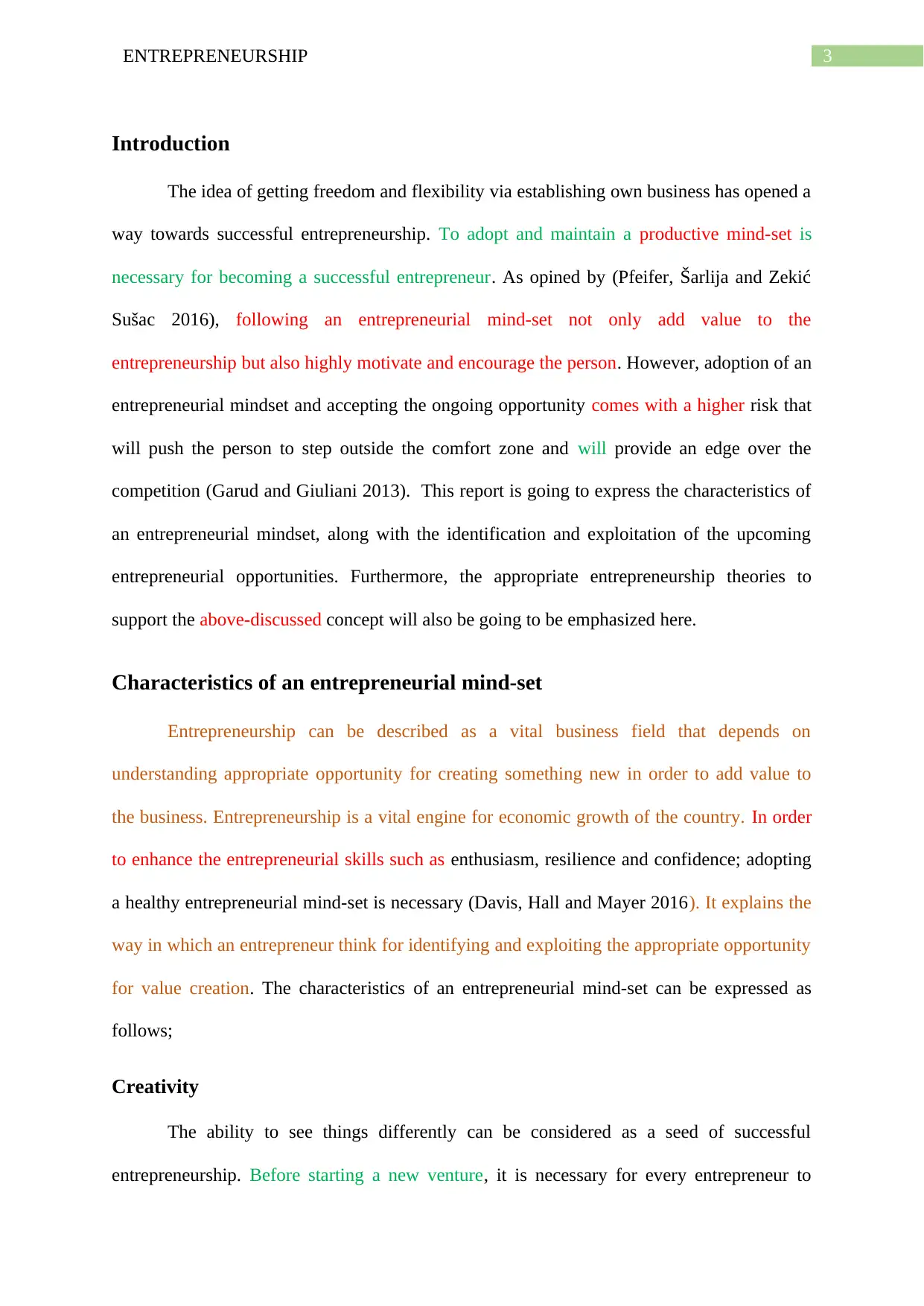
3ENTREPRENEURSHIP
Introduction
The idea of getting freedom and flexibility via establishing own business has opened a
way towards successful entrepreneurship. To adopt and maintain a productive mind-set is
necessary for becoming a successful entrepreneur. As opined by (Pfeifer, Šarlija and Zekić
Sušac 2016), following an entrepreneurial mind-set not only add value to the
entrepreneurship but also highly motivate and encourage the person. However, adoption of an
entrepreneurial mindset and accepting the ongoing opportunity comes with a higher risk that
will push the person to step outside the comfort zone and will provide an edge over the
competition (Garud and Giuliani 2013). This report is going to express the characteristics of
an entrepreneurial mindset, along with the identification and exploitation of the upcoming
entrepreneurial opportunities. Furthermore, the appropriate entrepreneurship theories to
support the above-discussed concept will also be going to be emphasized here.
Characteristics of an entrepreneurial mind-set
Entrepreneurship can be described as a vital business field that depends on
understanding appropriate opportunity for creating something new in order to add value to
the business. Entrepreneurship is a vital engine for economic growth of the country. In order
to enhance the entrepreneurial skills such as enthusiasm, resilience and confidence; adopting
a healthy entrepreneurial mind-set is necessary (Davis, Hall and Mayer 2016). It explains the
way in which an entrepreneur think for identifying and exploiting the appropriate opportunity
for value creation. The characteristics of an entrepreneurial mind-set can be expressed as
follows;
Creativity
The ability to see things differently can be considered as a seed of successful
entrepreneurship. Before starting a new venture, it is necessary for every entrepreneur to
Introduction
The idea of getting freedom and flexibility via establishing own business has opened a
way towards successful entrepreneurship. To adopt and maintain a productive mind-set is
necessary for becoming a successful entrepreneur. As opined by (Pfeifer, Šarlija and Zekić
Sušac 2016), following an entrepreneurial mind-set not only add value to the
entrepreneurship but also highly motivate and encourage the person. However, adoption of an
entrepreneurial mindset and accepting the ongoing opportunity comes with a higher risk that
will push the person to step outside the comfort zone and will provide an edge over the
competition (Garud and Giuliani 2013). This report is going to express the characteristics of
an entrepreneurial mindset, along with the identification and exploitation of the upcoming
entrepreneurial opportunities. Furthermore, the appropriate entrepreneurship theories to
support the above-discussed concept will also be going to be emphasized here.
Characteristics of an entrepreneurial mind-set
Entrepreneurship can be described as a vital business field that depends on
understanding appropriate opportunity for creating something new in order to add value to
the business. Entrepreneurship is a vital engine for economic growth of the country. In order
to enhance the entrepreneurial skills such as enthusiasm, resilience and confidence; adopting
a healthy entrepreneurial mind-set is necessary (Davis, Hall and Mayer 2016). It explains the
way in which an entrepreneur think for identifying and exploiting the appropriate opportunity
for value creation. The characteristics of an entrepreneurial mind-set can be expressed as
follows;
Creativity
The ability to see things differently can be considered as a seed of successful
entrepreneurship. Before starting a new venture, it is necessary for every entrepreneur to
Paraphrase This Document
Need a fresh take? Get an instant paraphrase of this document with our AI Paraphraser
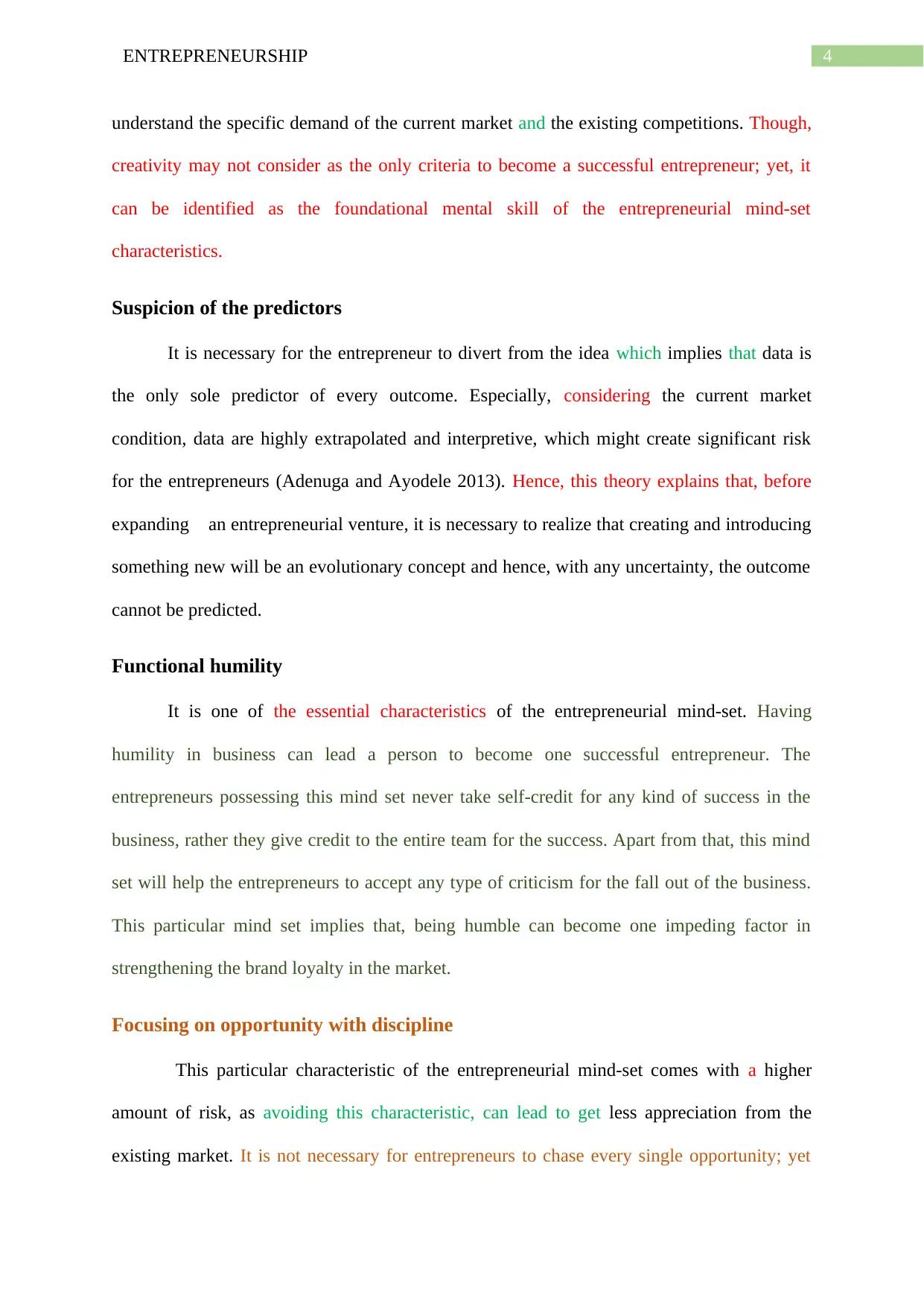
4ENTREPRENEURSHIP
understand the specific demand of the current market and the existing competitions. Though,
creativity may not consider as the only criteria to become a successful entrepreneur; yet, it
can be identified as the foundational mental skill of the entrepreneurial mind-set
characteristics.
Suspicion of the predictors
It is necessary for the entrepreneur to divert from the idea which implies that data is
the only sole predictor of every outcome. Especially, considering the current market
condition, data are highly extrapolated and interpretive, which might create significant risk
for the entrepreneurs (Adenuga and Ayodele 2013). Hence, this theory explains that, before
expanding an entrepreneurial venture, it is necessary to realize that creating and introducing
something new will be an evolutionary concept and hence, with any uncertainty, the outcome
cannot be predicted.
Functional humility
It is one of the essential characteristics of the entrepreneurial mind-set. Having
humility in business can lead a person to become one successful entrepreneur. The
entrepreneurs possessing this mind set never take self-credit for any kind of success in the
business, rather they give credit to the entire team for the success. Apart from that, this mind
set will help the entrepreneurs to accept any type of criticism for the fall out of the business.
This particular mind set implies that, being humble can become one impeding factor in
strengthening the brand loyalty in the market.
Focusing on opportunity with discipline
This particular characteristic of the entrepreneurial mind-set comes with a higher
amount of risk, as avoiding this characteristic, can lead to get less appreciation from the
existing market. It is not necessary for entrepreneurs to chase every single opportunity; yet
understand the specific demand of the current market and the existing competitions. Though,
creativity may not consider as the only criteria to become a successful entrepreneur; yet, it
can be identified as the foundational mental skill of the entrepreneurial mind-set
characteristics.
Suspicion of the predictors
It is necessary for the entrepreneur to divert from the idea which implies that data is
the only sole predictor of every outcome. Especially, considering the current market
condition, data are highly extrapolated and interpretive, which might create significant risk
for the entrepreneurs (Adenuga and Ayodele 2013). Hence, this theory explains that, before
expanding an entrepreneurial venture, it is necessary to realize that creating and introducing
something new will be an evolutionary concept and hence, with any uncertainty, the outcome
cannot be predicted.
Functional humility
It is one of the essential characteristics of the entrepreneurial mind-set. Having
humility in business can lead a person to become one successful entrepreneur. The
entrepreneurs possessing this mind set never take self-credit for any kind of success in the
business, rather they give credit to the entire team for the success. Apart from that, this mind
set will help the entrepreneurs to accept any type of criticism for the fall out of the business.
This particular mind set implies that, being humble can become one impeding factor in
strengthening the brand loyalty in the market.
Focusing on opportunity with discipline
This particular characteristic of the entrepreneurial mind-set comes with a higher
amount of risk, as avoiding this characteristic, can lead to get less appreciation from the
existing market. It is not necessary for entrepreneurs to chase every single opportunity; yet
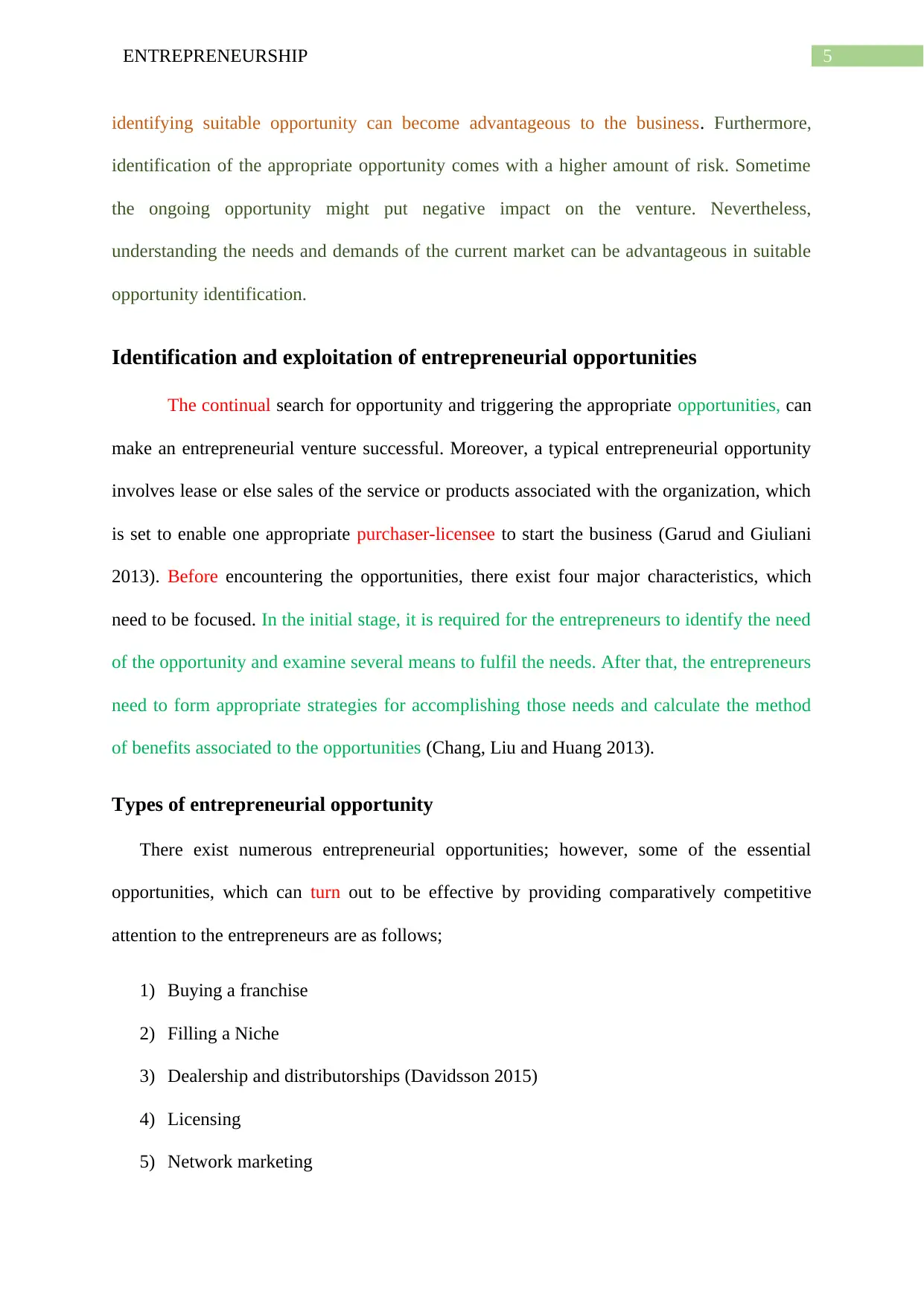
5ENTREPRENEURSHIP
identifying suitable opportunity can become advantageous to the business. Furthermore,
identification of the appropriate opportunity comes with a higher amount of risk. Sometime
the ongoing opportunity might put negative impact on the venture. Nevertheless,
understanding the needs and demands of the current market can be advantageous in suitable
opportunity identification.
Identification and exploitation of entrepreneurial opportunities
The continual search for opportunity and triggering the appropriate opportunities, can
make an entrepreneurial venture successful. Moreover, a typical entrepreneurial opportunity
involves lease or else sales of the service or products associated with the organization, which
is set to enable one appropriate purchaser-licensee to start the business (Garud and Giuliani
2013). Before encountering the opportunities, there exist four major characteristics, which
need to be focused. In the initial stage, it is required for the entrepreneurs to identify the need
of the opportunity and examine several means to fulfil the needs. After that, the entrepreneurs
need to form appropriate strategies for accomplishing those needs and calculate the method
of benefits associated to the opportunities (Chang, Liu and Huang 2013).
Types of entrepreneurial opportunity
There exist numerous entrepreneurial opportunities; however, some of the essential
opportunities, which can turn out to be effective by providing comparatively competitive
attention to the entrepreneurs are as follows;
1) Buying a franchise
2) Filling a Niche
3) Dealership and distributorships (Davidsson 2015)
4) Licensing
5) Network marketing
identifying suitable opportunity can become advantageous to the business. Furthermore,
identification of the appropriate opportunity comes with a higher amount of risk. Sometime
the ongoing opportunity might put negative impact on the venture. Nevertheless,
understanding the needs and demands of the current market can be advantageous in suitable
opportunity identification.
Identification and exploitation of entrepreneurial opportunities
The continual search for opportunity and triggering the appropriate opportunities, can
make an entrepreneurial venture successful. Moreover, a typical entrepreneurial opportunity
involves lease or else sales of the service or products associated with the organization, which
is set to enable one appropriate purchaser-licensee to start the business (Garud and Giuliani
2013). Before encountering the opportunities, there exist four major characteristics, which
need to be focused. In the initial stage, it is required for the entrepreneurs to identify the need
of the opportunity and examine several means to fulfil the needs. After that, the entrepreneurs
need to form appropriate strategies for accomplishing those needs and calculate the method
of benefits associated to the opportunities (Chang, Liu and Huang 2013).
Types of entrepreneurial opportunity
There exist numerous entrepreneurial opportunities; however, some of the essential
opportunities, which can turn out to be effective by providing comparatively competitive
attention to the entrepreneurs are as follows;
1) Buying a franchise
2) Filling a Niche
3) Dealership and distributorships (Davidsson 2015)
4) Licensing
5) Network marketing
⊘ This is a preview!⊘
Do you want full access?
Subscribe today to unlock all pages.

Trusted by 1+ million students worldwide
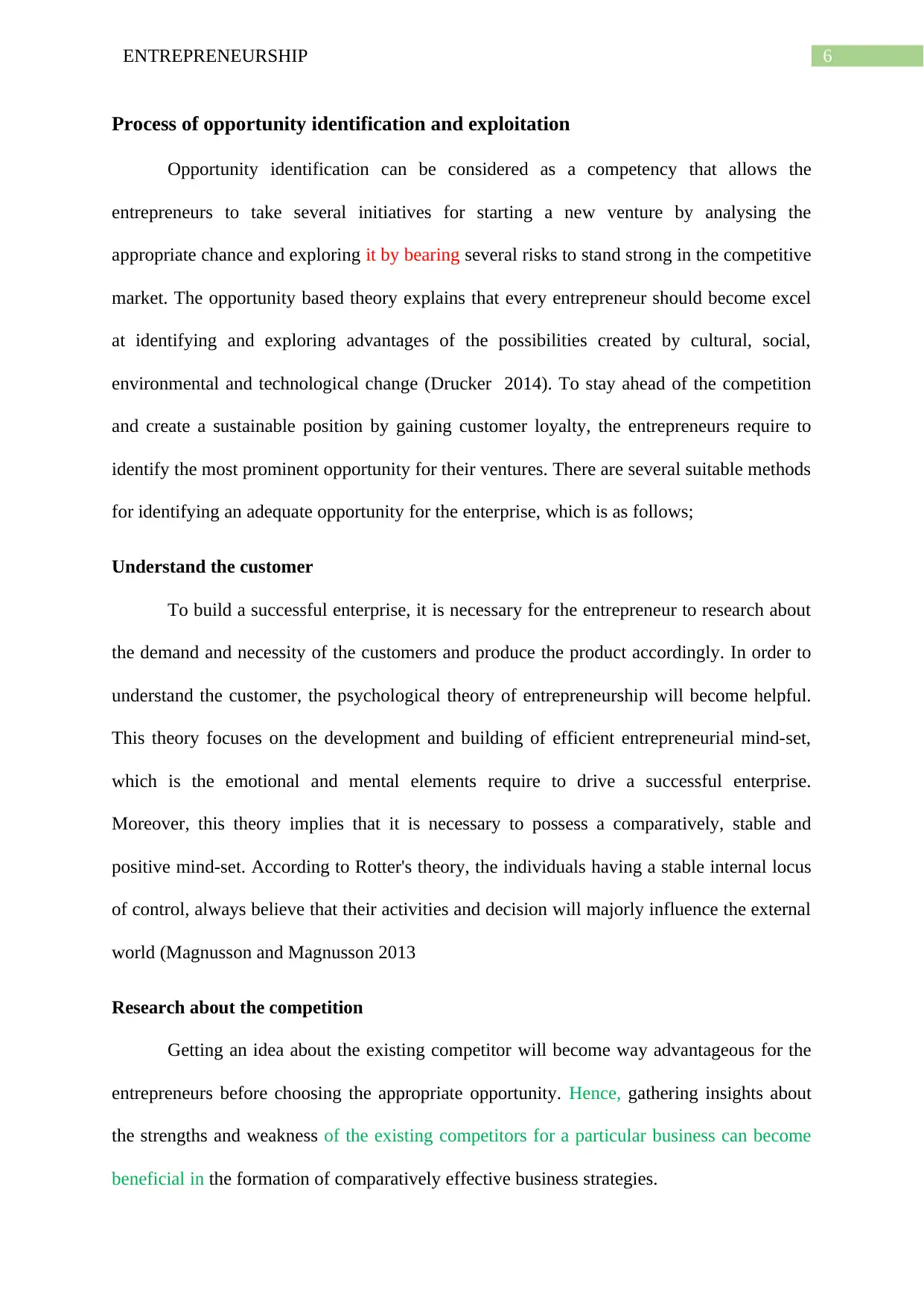
6ENTREPRENEURSHIP
Process of opportunity identification and exploitation
Opportunity identification can be considered as a competency that allows the
entrepreneurs to take several initiatives for starting a new venture by analysing the
appropriate chance and exploring it by bearing several risks to stand strong in the competitive
market. The opportunity based theory explains that every entrepreneur should become excel
at identifying and exploring advantages of the possibilities created by cultural, social,
environmental and technological change (Drucker 2014). To stay ahead of the competition
and create a sustainable position by gaining customer loyalty, the entrepreneurs require to
identify the most prominent opportunity for their ventures. There are several suitable methods
for identifying an adequate opportunity for the enterprise, which is as follows;
Understand the customer
To build a successful enterprise, it is necessary for the entrepreneur to research about
the demand and necessity of the customers and produce the product accordingly. In order to
understand the customer, the psychological theory of entrepreneurship will become helpful.
This theory focuses on the development and building of efficient entrepreneurial mind-set,
which is the emotional and mental elements require to drive a successful enterprise.
Moreover, this theory implies that it is necessary to possess a comparatively, stable and
positive mind-set. According to Rotter's theory, the individuals having a stable internal locus
of control, always believe that their activities and decision will majorly influence the external
world (Magnusson and Magnusson 2013
Research about the competition
Getting an idea about the existing competitor will become way advantageous for the
entrepreneurs before choosing the appropriate opportunity. Hence, gathering insights about
the strengths and weakness of the existing competitors for a particular business can become
beneficial in the formation of comparatively effective business strategies.
Process of opportunity identification and exploitation
Opportunity identification can be considered as a competency that allows the
entrepreneurs to take several initiatives for starting a new venture by analysing the
appropriate chance and exploring it by bearing several risks to stand strong in the competitive
market. The opportunity based theory explains that every entrepreneur should become excel
at identifying and exploring advantages of the possibilities created by cultural, social,
environmental and technological change (Drucker 2014). To stay ahead of the competition
and create a sustainable position by gaining customer loyalty, the entrepreneurs require to
identify the most prominent opportunity for their ventures. There are several suitable methods
for identifying an adequate opportunity for the enterprise, which is as follows;
Understand the customer
To build a successful enterprise, it is necessary for the entrepreneur to research about
the demand and necessity of the customers and produce the product accordingly. In order to
understand the customer, the psychological theory of entrepreneurship will become helpful.
This theory focuses on the development and building of efficient entrepreneurial mind-set,
which is the emotional and mental elements require to drive a successful enterprise.
Moreover, this theory implies that it is necessary to possess a comparatively, stable and
positive mind-set. According to Rotter's theory, the individuals having a stable internal locus
of control, always believe that their activities and decision will majorly influence the external
world (Magnusson and Magnusson 2013
Research about the competition
Getting an idea about the existing competitor will become way advantageous for the
entrepreneurs before choosing the appropriate opportunity. Hence, gathering insights about
the strengths and weakness of the existing competitors for a particular business can become
beneficial in the formation of comparatively effective business strategies.
Paraphrase This Document
Need a fresh take? Get an instant paraphrase of this document with our AI Paraphraser
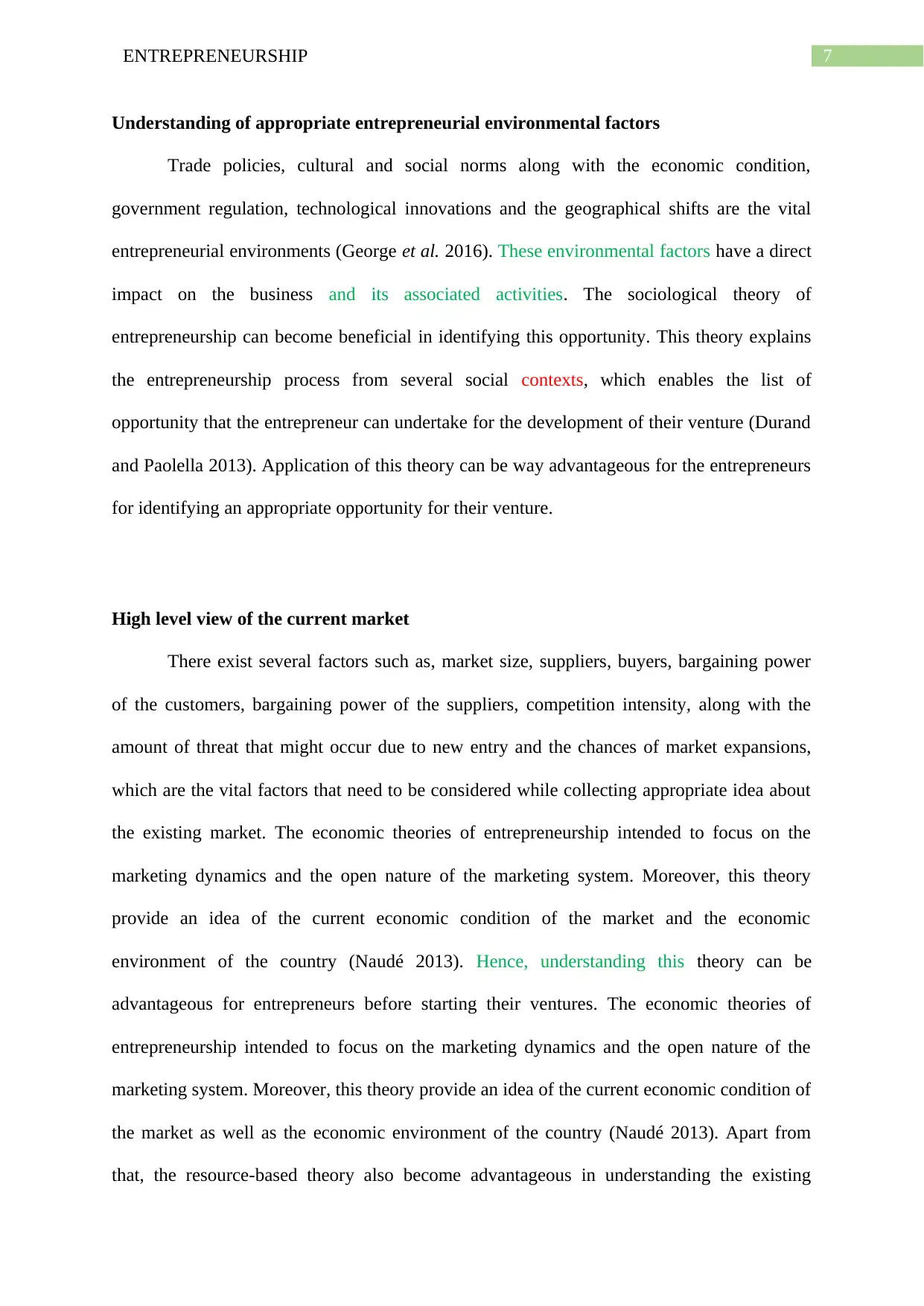
7ENTREPRENEURSHIP
Understanding of appropriate entrepreneurial environmental factors
Trade policies, cultural and social norms along with the economic condition,
government regulation, technological innovations and the geographical shifts are the vital
entrepreneurial environments (George et al. 2016). These environmental factors have a direct
impact on the business and its associated activities. The sociological theory of
entrepreneurship can become beneficial in identifying this opportunity. This theory explains
the entrepreneurship process from several social contexts, which enables the list of
opportunity that the entrepreneur can undertake for the development of their venture (Durand
and Paolella 2013). Application of this theory can be way advantageous for the entrepreneurs
for identifying an appropriate opportunity for their venture.
High level view of the current market
There exist several factors such as, market size, suppliers, buyers, bargaining power
of the customers, bargaining power of the suppliers, competition intensity, along with the
amount of threat that might occur due to new entry and the chances of market expansions,
which are the vital factors that need to be considered while collecting appropriate idea about
the existing market. The economic theories of entrepreneurship intended to focus on the
marketing dynamics and the open nature of the marketing system. Moreover, this theory
provide an idea of the current economic condition of the market and the economic
environment of the country (Naudé 2013). Hence, understanding this theory can be
advantageous for entrepreneurs before starting their ventures. The economic theories of
entrepreneurship intended to focus on the marketing dynamics and the open nature of the
marketing system. Moreover, this theory provide an idea of the current economic condition of
the market as well as the economic environment of the country (Naudé 2013). Apart from
that, the resource-based theory also become advantageous in understanding the existing
Understanding of appropriate entrepreneurial environmental factors
Trade policies, cultural and social norms along with the economic condition,
government regulation, technological innovations and the geographical shifts are the vital
entrepreneurial environments (George et al. 2016). These environmental factors have a direct
impact on the business and its associated activities. The sociological theory of
entrepreneurship can become beneficial in identifying this opportunity. This theory explains
the entrepreneurship process from several social contexts, which enables the list of
opportunity that the entrepreneur can undertake for the development of their venture (Durand
and Paolella 2013). Application of this theory can be way advantageous for the entrepreneurs
for identifying an appropriate opportunity for their venture.
High level view of the current market
There exist several factors such as, market size, suppliers, buyers, bargaining power
of the customers, bargaining power of the suppliers, competition intensity, along with the
amount of threat that might occur due to new entry and the chances of market expansions,
which are the vital factors that need to be considered while collecting appropriate idea about
the existing market. The economic theories of entrepreneurship intended to focus on the
marketing dynamics and the open nature of the marketing system. Moreover, this theory
provide an idea of the current economic condition of the market and the economic
environment of the country (Naudé 2013). Hence, understanding this theory can be
advantageous for entrepreneurs before starting their ventures. The economic theories of
entrepreneurship intended to focus on the marketing dynamics and the open nature of the
marketing system. Moreover, this theory provide an idea of the current economic condition of
the market as well as the economic environment of the country (Naudé 2013). Apart from
that, the resource-based theory also become advantageous in understanding the existing
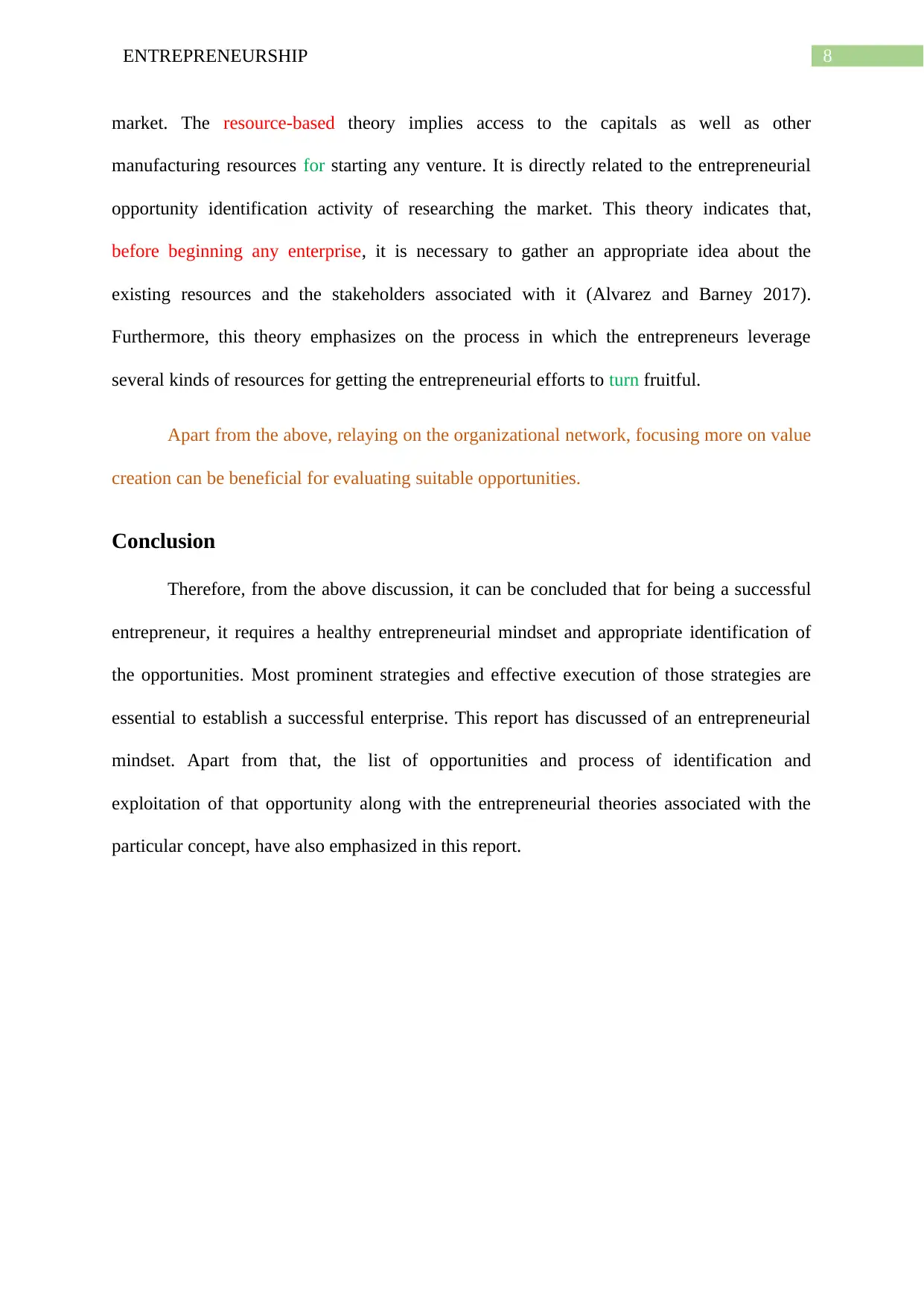
8ENTREPRENEURSHIP
market. The resource-based theory implies access to the capitals as well as other
manufacturing resources for starting any venture. It is directly related to the entrepreneurial
opportunity identification activity of researching the market. This theory indicates that,
before beginning any enterprise, it is necessary to gather an appropriate idea about the
existing resources and the stakeholders associated with it (Alvarez and Barney 2017).
Furthermore, this theory emphasizes on the process in which the entrepreneurs leverage
several kinds of resources for getting the entrepreneurial efforts to turn fruitful.
Apart from the above, relaying on the organizational network, focusing more on value
creation can be beneficial for evaluating suitable opportunities.
Conclusion
Therefore, from the above discussion, it can be concluded that for being a successful
entrepreneur, it requires a healthy entrepreneurial mindset and appropriate identification of
the opportunities. Most prominent strategies and effective execution of those strategies are
essential to establish a successful enterprise. This report has discussed of an entrepreneurial
mindset. Apart from that, the list of opportunities and process of identification and
exploitation of that opportunity along with the entrepreneurial theories associated with the
particular concept, have also emphasized in this report.
market. The resource-based theory implies access to the capitals as well as other
manufacturing resources for starting any venture. It is directly related to the entrepreneurial
opportunity identification activity of researching the market. This theory indicates that,
before beginning any enterprise, it is necessary to gather an appropriate idea about the
existing resources and the stakeholders associated with it (Alvarez and Barney 2017).
Furthermore, this theory emphasizes on the process in which the entrepreneurs leverage
several kinds of resources for getting the entrepreneurial efforts to turn fruitful.
Apart from the above, relaying on the organizational network, focusing more on value
creation can be beneficial for evaluating suitable opportunities.
Conclusion
Therefore, from the above discussion, it can be concluded that for being a successful
entrepreneur, it requires a healthy entrepreneurial mindset and appropriate identification of
the opportunities. Most prominent strategies and effective execution of those strategies are
essential to establish a successful enterprise. This report has discussed of an entrepreneurial
mindset. Apart from that, the list of opportunities and process of identification and
exploitation of that opportunity along with the entrepreneurial theories associated with the
particular concept, have also emphasized in this report.
⊘ This is a preview!⊘
Do you want full access?
Subscribe today to unlock all pages.

Trusted by 1+ million students worldwide
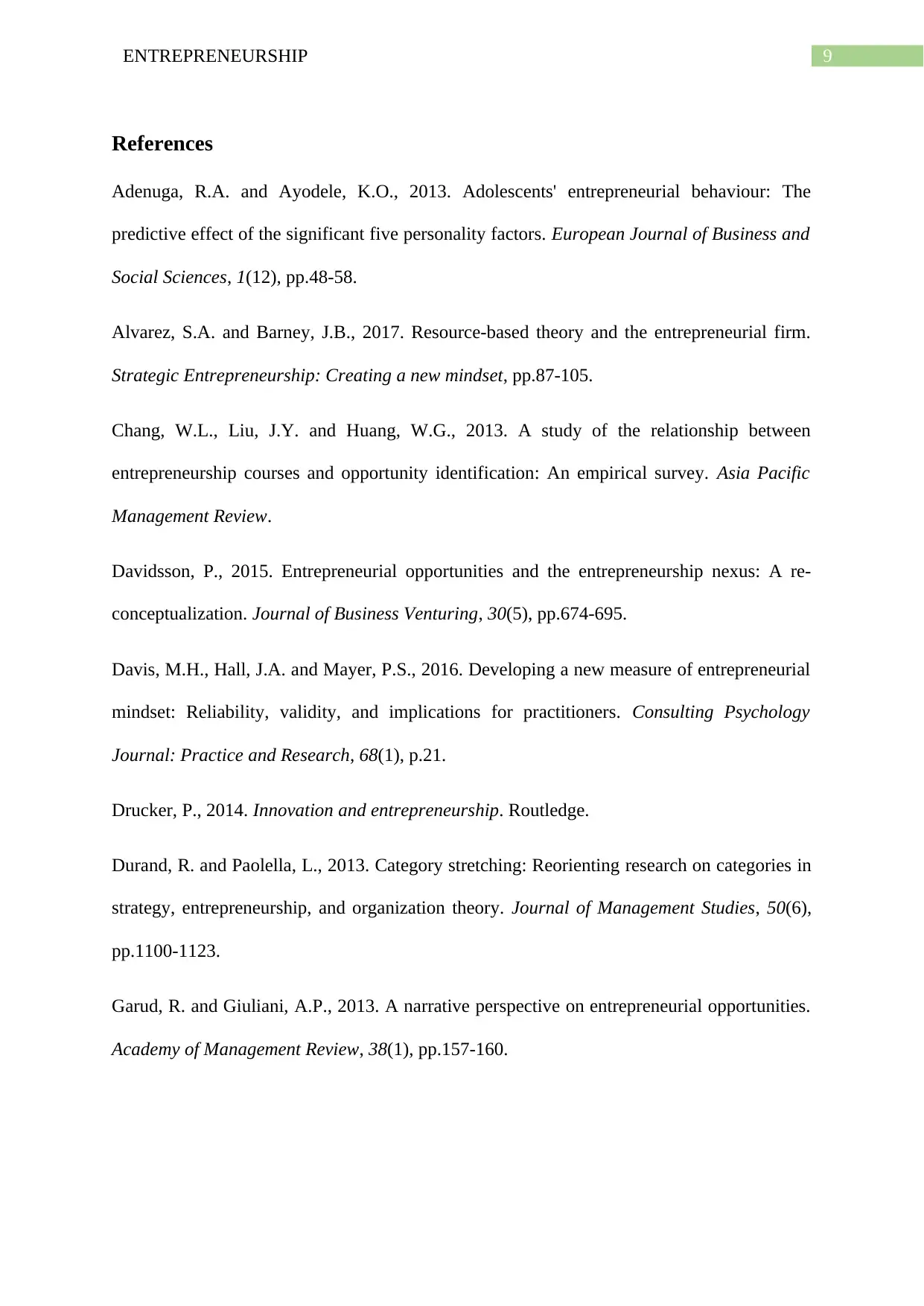
9ENTREPRENEURSHIP
References
Adenuga, R.A. and Ayodele, K.O., 2013. Adolescents' entrepreneurial behaviour: The
predictive effect of the significant five personality factors. European Journal of Business and
Social Sciences, 1(12), pp.48-58.
Alvarez, S.A. and Barney, J.B., 2017. Resource‐based theory and the entrepreneurial firm.
Strategic Entrepreneurship: Creating a new mindset, pp.87-105.
Chang, W.L., Liu, J.Y. and Huang, W.G., 2013. A study of the relationship between
entrepreneurship courses and opportunity identification: An empirical survey. Asia Pacific
Management Review.
Davidsson, P., 2015. Entrepreneurial opportunities and the entrepreneurship nexus: A re-
conceptualization. Journal of Business Venturing, 30(5), pp.674-695.
Davis, M.H., Hall, J.A. and Mayer, P.S., 2016. Developing a new measure of entrepreneurial
mindset: Reliability, validity, and implications for practitioners. Consulting Psychology
Journal: Practice and Research, 68(1), p.21.
Drucker, P., 2014. Innovation and entrepreneurship. Routledge.
Durand, R. and Paolella, L., 2013. Category stretching: Reorienting research on categories in
strategy, entrepreneurship, and organization theory. Journal of Management Studies, 50(6),
pp.1100-1123.
Garud, R. and Giuliani, A.P., 2013. A narrative perspective on entrepreneurial opportunities.
Academy of Management Review, 38(1), pp.157-160.
References
Adenuga, R.A. and Ayodele, K.O., 2013. Adolescents' entrepreneurial behaviour: The
predictive effect of the significant five personality factors. European Journal of Business and
Social Sciences, 1(12), pp.48-58.
Alvarez, S.A. and Barney, J.B., 2017. Resource‐based theory and the entrepreneurial firm.
Strategic Entrepreneurship: Creating a new mindset, pp.87-105.
Chang, W.L., Liu, J.Y. and Huang, W.G., 2013. A study of the relationship between
entrepreneurship courses and opportunity identification: An empirical survey. Asia Pacific
Management Review.
Davidsson, P., 2015. Entrepreneurial opportunities and the entrepreneurship nexus: A re-
conceptualization. Journal of Business Venturing, 30(5), pp.674-695.
Davis, M.H., Hall, J.A. and Mayer, P.S., 2016. Developing a new measure of entrepreneurial
mindset: Reliability, validity, and implications for practitioners. Consulting Psychology
Journal: Practice and Research, 68(1), p.21.
Drucker, P., 2014. Innovation and entrepreneurship. Routledge.
Durand, R. and Paolella, L., 2013. Category stretching: Reorienting research on categories in
strategy, entrepreneurship, and organization theory. Journal of Management Studies, 50(6),
pp.1100-1123.
Garud, R. and Giuliani, A.P., 2013. A narrative perspective on entrepreneurial opportunities.
Academy of Management Review, 38(1), pp.157-160.
Paraphrase This Document
Need a fresh take? Get an instant paraphrase of this document with our AI Paraphraser
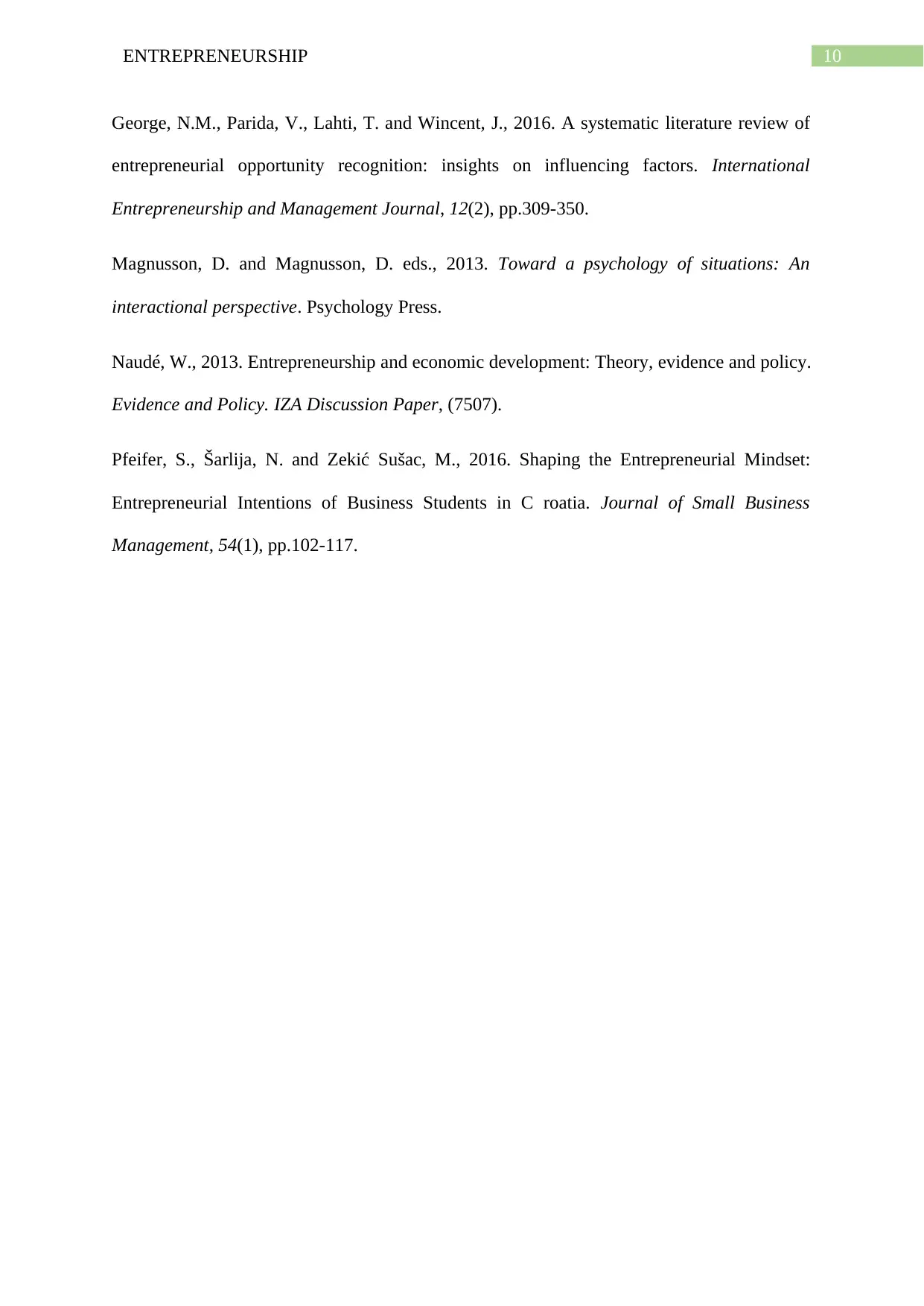
10ENTREPRENEURSHIP
George, N.M., Parida, V., Lahti, T. and Wincent, J., 2016. A systematic literature review of
entrepreneurial opportunity recognition: insights on influencing factors. International
Entrepreneurship and Management Journal, 12(2), pp.309-350.
Magnusson, D. and Magnusson, D. eds., 2013. Toward a psychology of situations: An
interactional perspective. Psychology Press.
Naudé, W., 2013. Entrepreneurship and economic development: Theory, evidence and policy.
Evidence and Policy. IZA Discussion Paper, (7507).
Pfeifer, S., Šarlija, N. and Zekić Sušac, M., 2016. Shaping the Entrepreneurial Mindset:
Entrepreneurial Intentions of Business Students in C roatia. Journal of Small Business
Management, 54(1), pp.102-117.
George, N.M., Parida, V., Lahti, T. and Wincent, J., 2016. A systematic literature review of
entrepreneurial opportunity recognition: insights on influencing factors. International
Entrepreneurship and Management Journal, 12(2), pp.309-350.
Magnusson, D. and Magnusson, D. eds., 2013. Toward a psychology of situations: An
interactional perspective. Psychology Press.
Naudé, W., 2013. Entrepreneurship and economic development: Theory, evidence and policy.
Evidence and Policy. IZA Discussion Paper, (7507).
Pfeifer, S., Šarlija, N. and Zekić Sušac, M., 2016. Shaping the Entrepreneurial Mindset:
Entrepreneurial Intentions of Business Students in C roatia. Journal of Small Business
Management, 54(1), pp.102-117.

11ENTREPRENEURSHIP
⊘ This is a preview!⊘
Do you want full access?
Subscribe today to unlock all pages.

Trusted by 1+ million students worldwide
1 out of 12
Related Documents
Your All-in-One AI-Powered Toolkit for Academic Success.
+13062052269
info@desklib.com
Available 24*7 on WhatsApp / Email
![[object Object]](/_next/static/media/star-bottom.7253800d.svg)
Unlock your academic potential
Copyright © 2020–2026 A2Z Services. All Rights Reserved. Developed and managed by ZUCOL.




